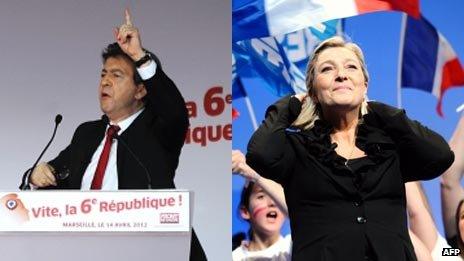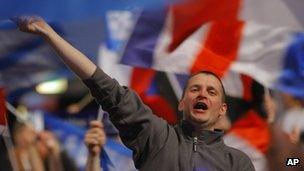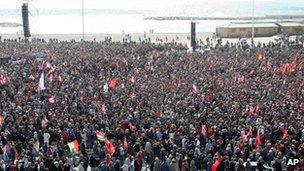France elections: The far right and far left
- Published
- comments

Jean-Luc Melenchon and Marine Le Pen attracted big crowds this week
Surrounded by a flag-waving, foot-stamping audience Marine Le Pen spread her arms wide and shouted "Yes, France - shout your rage and scream your hope". She threw her arms out once more as she concluded with a cry: "Yes France."
She stood there enjoying the rapture of an audience of 6,000 that filled the Zenith convention centre in Paris for the final rally of her campaign. She has become a powerful if at times operatic speaker. She bounced on to the stage in her black trouser suit and blonde hair, waving and smiling.
Like Eva Peron, she presents herself as a fighter for neglected working people. She is against "les aristocrates" - the elites. "Sarkozy and Hollande represent the interests of the rich and powerful," she tells her audience.
She has rebranded the party. It is still fiercely anti-immigrant but she has moved against extremists and those who were openly racist. She has broadened the appeal of the party led by her father Jean-Marie Le Pen who sat in the audience.
Her message is simple but powerful: France's identity is being destroyed by immigration and by a European elite. "You want to feel at home in your own country," she tells her supporters and they know what she means.
She repeatedly mentioned immigration but she has cleverly linked concerns about identity with the economic crisis. She tells her audience that globalisation has taken their jobs from them. She blames the European elite and says that the European dream has turned into a nightmare and lives have been wrecked.
One recent poll gave her 17% of the vote. Back in January she had hoped she would reach 20% but that seems unrealistic now. In 2002 her father got 16.9% of the vote and a place in the second round.
Young audience

One poll suggested Marine Le Pen was the most popular leader among young people
But part of this campaign is about building a wider movement for the future. One of the features of her crowd was the number of young people. This was a very different audience to the one that used to attend National Front rallies.
One recent poll indicated that among 16 to 24-year-olds she was the most popular party leader. After her speech she made a point of being surrounded by young people on stage.
Every time there was mention of Nicolas Sarkozy the audience booed. They feel betrayed by him. At difficult times, they tell you, the French president tried to steal their clothes and to speak their language but in office he has not delivered.
So, come the second round, when the two remaining candidates are likely to be President Sarkozy and the Socialist candidate Francois Hollande, the president will be at a disadvantage.
Francois Hollande can depend on the far left voting for him. Nicolas Sarkozy cannot depend on the support of the far right.
Socialist dream

Around 100,000 people came to hear Jean-Luc Melenchon speak
The star of the first round has been the far left candidate Jean-Luc Melenchon. He has got the attention and has seen his poll ratings shoot up to 14 or 15%. He, too, has drawn large crowds.
Around 100,000 came to the beach in Marseille to hear him last weekend.
He blends the romance of the Socialist dream with the current anger towards the bankers and capitalism. He calls for a civic uprising and places himself in the revolutionary tradition.
He, too, believes that international finance and austerity - as embraced by the European Union - is destroying the lives of ordinary people.
He would increase the minimum wage and cut the age of retirement. Unashamedly, he supports a redistribution of wealth. He would tax income of over 350,000 euros a year at 100%. The old left, the communists and an army of new voters embittered by the economic crisis have come to his side.
The crowd like his directness and the romance of his language. He is trying to build a movement of the left that he hopes will do well in the parliamentary elections in June.
He believes that what happens in France will act as a beacon across Europe where he sees a European movement of the left challenging the narrative as told by the IMF, the ECB and Brussels.
He has said his supporters will support Francois Hollande in the second round. The Sarkozy camp are warning that, if elected, Hollande would be a prisoner of a far-left firebrand.
Detached from reality
France does not seem in the mood to discuss the spending cuts that will surely have to come or the changes to their welfare system that must follow. There are no debates about regaining competitiveness.
Nicolas Sarkozy has fallen silent on the need to make France more like Germany. The election is strangely detached from reality. It is all about who will save the French dream, who will persuade the French that their way of life, with all its benefits, can be protected.
What links the far left and the far right is a belief that the European Union is not on the side of working people and that globalisation benefits the elites. And, in the first round, this view may attract 30% of the votes.
Standing with the crowd in the Zenith the other night, the same thought occurred to me whilst covering the Obama campaign four years ago. What has happened to the political rally in Britain? What British leader would gather 100,000 on a beach or fill the equivalent of the Place de la Concorde in Paris?
What has happened to making the political pitch not to a TV audience but to a large crowd with all its uncertainties.